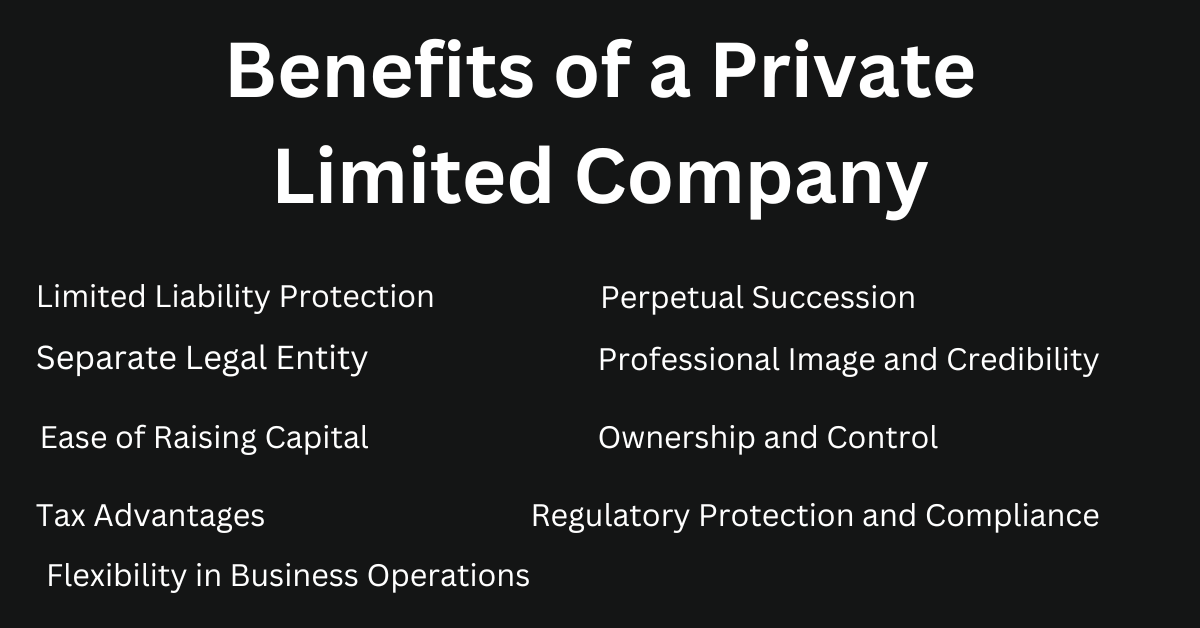Benefits of a Private Limited Company

Introduction
When starting a business, one of the most important decisions to make is selecting the right legal structure. A private limited company (Ltd) is a popular choice for many entrepreneurs and small to medium-sized businesses. This type of business structure offers a range of benefits that provide greater flexibility, legal protection, and credibility compared to other forms like sole proprietorships or partnerships.
A private limited company is a separate legal entity, which means it operates independently from its owners or shareholders. This separation brings numerous advantages, from limited liability to easier access to funding. In this article, we will explore the benefits of forming a private limited company and why it is often preferred by business owners.
1. Limited Liability Protection
One of the primary benefits of setting up a private limited company is limited liability. This means that the personal assets of shareholders (the owners of the company) are protected in case the company faces financial difficulties or lawsuits. Shareholders are only liable for the company’s debts up to the amount they have invested in the company.
For example, if a private limited company incurs a debt of $500,000 but the shareholders have each invested $10,000, their personal assets (like homes or savings) cannot be seized to cover the debt. They will only lose the amount they have invested in the company. This limited liability provides peace of mind and financial security, making it a safer option for business owners compared to sole proprietorships, where personal assets are fully at risk.
2. Separate Legal Entity
A private limited company is acknowledged as a distinct legal entity, separate from its shareholders. This means that the company can enter into contracts, own property, sue or be sued in its own name, and continue its existence independently of its shareholders or directors. The company’s identity is distinct from the people who run it, and it continues to operate even if ownership changes.
The separate legal status also allows the business to create a professional image and enhances its credibility with customers, suppliers, and investors. This independent status gives potential clients and partners confidence in dealing with the company, as they view it as a more established and secure organization.
3. Ease of Raising Capital
Another significant benefit of a private limited company is the ability to raise capital more easily. Unlike sole proprietorships or partnerships, a private limited company can issue shares to raise funds from investors. This makes it an attractive option for businesses seeking investment or growth opportunities.
Shareholders can invest in the company in exchange for ownership equity, allowing the company to raise capital without taking on excessive debt. Moreover, private limited companies often have an easier time securing loans and other forms of financing from banks, as lenders view them as lower-risk investments due to their limited liability structure and separate legal entity status.
Additionally, as the company grows, there is potential to invite more investors by selling shares, which further facilitates expansion without compromising the company’s core operations.
4. Tax Advantages
Operating as a private limited company offers several tax advantages compared to other business structures. While sole proprietorships and partnerships are taxed on personal income, private limited companies benefit from corporate tax rates, which are often lower than individual income tax rates.
Additionally, business expenses, such as salaries, office expenses, travel, and more, can be deducted from the company’s profits before calculating taxes. This helps reduce the company’s taxable income and overall tax burden. Furthermore, private limited companies have more opportunities to explore tax planning strategies, such as reinvesting profits into the business or claiming deductions for research and development (R&D) activities.
The ability to manage profits efficiently and potentially defer income also provides companies with more control over their tax obligations.
5. Perpetual Succession
One of the unique features of a private limited company is perpetual succession, meaning the company’s existence is not affected by changes in ownership or management. The death, retirement, or departure of a shareholder or director does not impact the continuity of the business.
This is especially important for family-owned businesses or enterprises looking to grow and expand over time. In a sole proprietorship or partnership, the business can cease to exist when the owner dies or retires. However, with a private limited company, the business can be passed down to future generations or sold without affecting its operations.
Perpetual succession ensures that the business continues to function as an independent entity, making it a more stable and reliable structure for long-term growth and success.
6. Professional Image and Credibility
Forming a private limited company can significantly enhance the professional image and credibility of a business. Customers, suppliers, and investors often perceive private limited companies as more trustworthy, established, and reliable compared to other business structures like sole proprietorships.
This enhanced reputation can lead to better business relationships, easier access to financing, and more opportunities for growth. Additionally, many larger organizations and government entities prefer to work with private limited companies due to their transparent corporate structure and regulated status.
Having the letters “Ltd” after the company name signals to the market that the business is serious, well-organized, and legally compliant. This can be a decisive factor in winning contracts, partnerships, or securing investment.
7. Ownership and Control
A private limited company offers flexibility in terms of ownership and control. The company can be owned by one or more individuals, known as shareholders, and the management is typically carried out by directors who may or may not be shareholders. The distribution of shares allows for clear ownership rights, and shareholders can transfer or sell their shares if they wish to exit the company.
This structure provides more clarity and control over decision-making processes, as shareholders have a say in major decisions and strategic direction based on their shareholdings. At the same time, directors are responsible for the company’s day-to-day operations and ensure compliance with regulatory requirements.
Furthermore, the company can introduce different classes of shares, each with varying levels of control, rights, and obligations. This allows for tailored ownership arrangements, which can be useful for attracting investors or accommodating business partners.
8. Regulatory Protection and Compliance
Private limited companies are required to adhere to various regulatory requirements, such as filing annual financial statements, maintaining proper records, and complying with tax obligations. While this may seem like a burden to some, it actually provides benefits in the form of legal protection and transparency.
By complying with these regulations, a private limited company enjoys the protection of the law, which can help prevent disputes among shareholders, avoid fraudulent activities, and ensure that the business operates in a transparent and accountable manner.
Moreover, adherence to legal requirements builds trust with stakeholders, including clients, suppliers, and investors. It assures them that the company is operating within the law and is less likely to face legal or financial problems down the line.
9. Flexibility in Business Operations
Private limited companies offer significant flexibility in terms of their operations. While they are subject to regulatory requirements, they have the freedom to manage internal affairs, decide on the distribution of profits, and make business decisions that align with their goals.
Directors can implement strategies for growth, change the company’s objectives, or even expand into new markets with ease. Additionally, shareholders have the flexibility to sell or transfer shares, which offers an exit strategy for investors without disrupting the company’s day-to-day activities.
Unlike sole proprietorships, where the owner is solely responsible for all decisions, a private limited company allows for shared responsibility among directors and shareholders, providing a more balanced and strategic approach to business management.
Conclusion
A private limited company offers numerous advantages that make it an attractive choice for entrepreneurs and business owners looking to establish a secure and credible enterprise. From limited liability protection and tax benefits to easier access to capital and enhanced professional image, the private limited company structure provides a solid foundation for long-term business growth and success.
Whether you’re starting a new business or looking to grow an existing one, forming a private limited company can offer the legal protections, flexibility, and credibility needed to succeed in today’s competitive market. By choosing this structure, business owners can focus on scaling their operations with the confidence that their personal assets are protected, and their company is built for sustainability.





